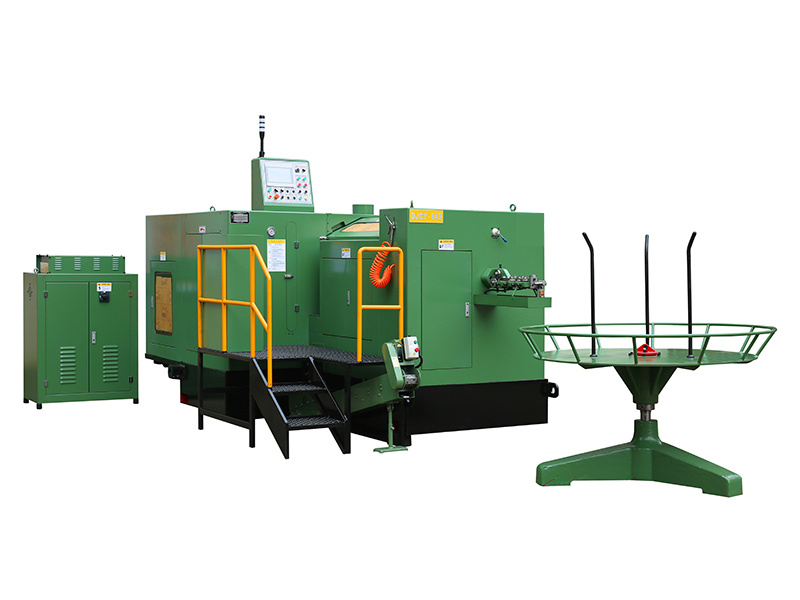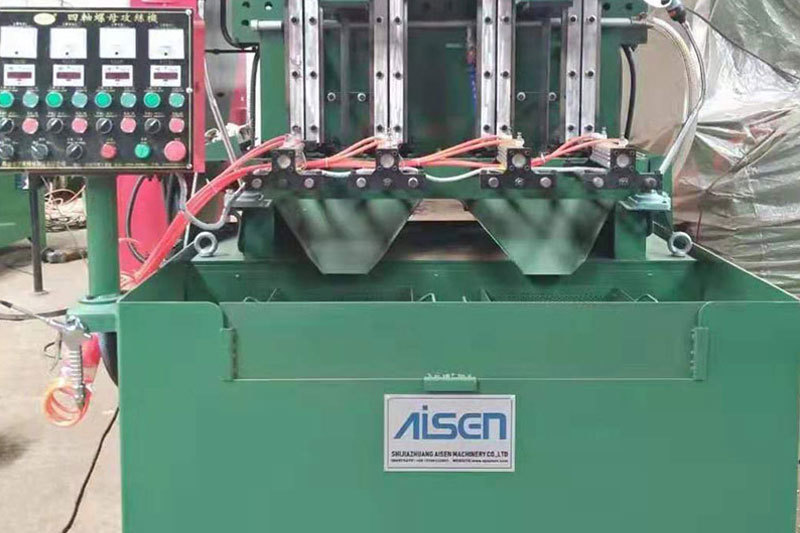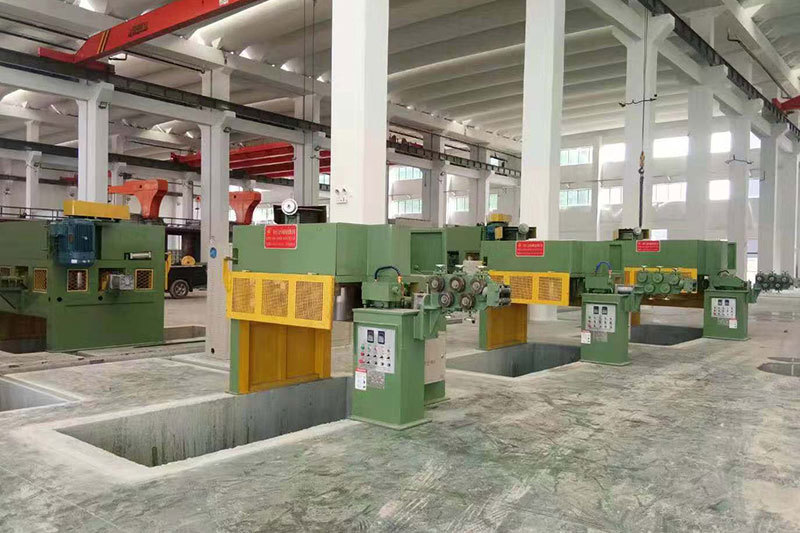Understanding the Impact of Bolt Cold Forging Machines on Various Industries
Summary:
What Industries Benefit from Bolt Cold Forging Machines?
Introduction to Bolt Cold Forging Technology
Bolt cold forging machines represent a pivotal innovation in the manufacturing sector, revolutionizing how we produce fasteners and other components. This technology employs a high-pressure process that shapes metal at room temperature, creating strong, durable products that meet the stringent dem

What Industries Benefit from Bolt Cold Forging Machines?
Introduction to Bolt Cold Forging Technology
Bolt cold forging machines represent a pivotal innovation in the manufacturing sector, revolutionizing how we produce fasteners and other components. This technology employs a high-pressure process that shapes metal at room temperature, creating strong, durable products that meet the stringent demands of various industries. As we explore the benefits of bolt cold forging machines, it becomes evident how these machines contribute to increased efficiency, reduced production costs, and enhanced product quality.
Table of Contents
- 1. Overview of Bolt Cold Forging Processes
- 2. Key Advantages of Bolt Cold Forging
- 3. Industries Leveraging Bolt Cold Forging Machines
- 3.1 Automotive Industry
- 3.2 Aerospace Sector
- 3.3 Construction Industry
- 3.4 Electronics Manufacturing
- 3.5 Oil and Gas Industry
- 4. The Cold Forging Process Explained
- 5. Future Trends in Bolt Cold Forging Technology
- 6. FAQs about Bolt Cold Forging Machines
- 7. Conclusion: The Growing Importance of Bolt Cold Forging Machines
1. Overview of Bolt Cold Forging Processes
Bolt cold forging is a manufacturing technique that transforms metal into various shapes without the need for heating. This process involves placing a metal blank into a die and applying mechanical pressure to form it into a desired shape. The cold forging process is highly efficient, enabling the production of complex geometries with superior surface quality. Furthermore, it minimizes waste material, making it an environmentally friendly alternative to traditional forging methods.
2. Key Advantages of Bolt Cold Forging
Bolt cold forging machines offer numerous benefits that enhance manufacturing processes:
2.1 Improved Mechanical Properties
Cold forging significantly strengthens the metal, enhancing its mechanical properties. The process aligns the grain structure, which results in improved tensile strength and durability.
2.2 Cost Efficiency
By reducing material waste and energy usage, bolt cold forging machines lower production costs. Additionally, the ability to produce parts in bulk further augments cost efficiency.
2.3 Precision and Consistency
The precision of cold forging machines ensures that each component meets exact specifications. This consistency is crucial for industries that require high-quality fasteners.
2.4 Shorter Production Times
The rapid nature of the cold forging process allows manufacturers to produce large quantities of parts quickly, reducing lead times and meeting market demands efficiently.
2.5 Environmentally Friendly
Cold forging is more sustainable than traditional methods, as it requires less energy and generates less waste, contributing to eco-friendly production practices.
3. Industries Leveraging Bolt Cold Forging Machines
The versatility of bolt cold forging machines means they are employed across various sectors. Below, we explore some of the primary industries that benefit from this technology.
3.1 Automotive Industry
The automotive sector is one of the largest users of bolt cold forging machines. These machines produce components such as bolts, nuts, and brackets essential for vehicle assembly. The strength and reliability of cold-forged parts contribute to vehicle safety and performance, making them indispensable to manufacturers.
3.2 Aerospace Sector
Aerospace manufacturers utilize bolt cold forging machines to create lightweight yet strong components required for aircraft. Fasteners produced through cold forging are critical in ensuring the structural integrity of planes, making this process vital for the aviation industry.
3.3 Construction Industry
The construction industry relies heavily on cold-forged fasteners to secure structures. From buildings to bridges, the strength and durability of these components are crucial for safety and longevity. Cold forging machines enable the production of high-quality fasteners that can withstand harsh environmental conditions.
3.4 Electronics Manufacturing
In the electronics sector, precise and reliable fastening solutions are required for assembling devices. Bolt cold forging machines provide the accuracy and consistency needed to produce components such as connectors and enclosures, which are essential for electronic devices.
3.5 Oil and Gas Industry
The oil and gas industry demands robust fastening solutions for various applications, including drilling and extraction operations. Cold-forged components meet the stringent requirements of this sector, offering durability and resistance to extreme conditions.
4. The Cold Forging Process Explained
Understanding the cold forging process is essential for appreciating its advantages. The following steps outline the typical cold forging procedure:
4.1 Material Selection
The process begins with selecting the appropriate metal, typically carbon steel or alloy steel, known for their favorable properties in cold forging.
4.2 Preparation of Blanks
Metal blanks are cut to predetermined sizes, ensuring they are ready for the forging process.
4.3 Die Setup
The manufacturing process involves designing and setting up dies that will shape the metal blanks into the desired forms.
4.4 Forging Process
The metal blanks are loaded into the cold forging machine, where they are subjected to high pressure. This pressure reshapes the metal without heating it, creating components with enhanced strength.
4.5 Finishing Operations
After forging, the components may undergo finishing processes such as trimming, machining, and surface treatment to achieve the final specifications.
5. Future Trends in Bolt Cold Forging Technology
As technology continues to evolve, bolt cold forging machines are also undergoing significant advancements. Future trends may include:
5.1 Automation and Robotics
The integration of automation and robotics in cold forging processes can enhance efficiency, reduce labor costs, and improve precision.
5.2 Smart Manufacturing
The incorporation of IoT (Internet of Things) technology will enable manufacturers to monitor processes in real time, allowing for better quality control and predictive maintenance.
5.3 Sustainable Practices
As industries strive for sustainability, the development of eco-friendly materials and processes will likely shape the future of cold forging technology.
6. FAQs about Bolt Cold Forging Machines
6.1 What materials can be used in bolt cold forging?
Bolt cold forging typically utilizes materials like carbon steel, alloy steels, and stainless steel due to their favorable mechanical properties.
6.2 How does cold forging differ from hot forging?
Cold forging is performed at room temperature, while hot forging involves heating the metal. Cold forging enhances material strength, while hot forging allows for more complex shapes.
6.3 Are cold-forged components more durable than conventionally produced parts?
Yes, cold-forged components generally exhibit superior strength, durability, and fatigue resistance due to the alignment of the material's grain structure.
6.4 What industries utilize bolt cold forging machines?
Industries such as automotive, aerospace, construction, electronics, and oil and gas benefit from bolt cold forging machines.
6.5 How do cold forging machines contribute to cost savings?
Cold forging reduces material waste, energy consumption, and production times, resulting in lower overall costs for manufacturers.
7. Conclusion: The Growing Importance of Bolt Cold Forging Machines
Bolt cold forging machines play a crucial role in modern manufacturing, providing industries with strong, durable components that meet rigorous specifications. The advantages of this technology, including enhanced mechanical properties, cost efficiency, and precision, make it an essential part of the production process across various sectors. As industries adapt to changing demands and seek sustainable practices, the significance of bolt cold forging machines will only continue to grow. By investing in these technologies, manufacturers can enhance their competitiveness and ensure they are well-equipped to meet the challenges of the future.
Latest News
AISEN Four axis nut tapping machine ready for shipment to Russia
Four axis nut tapping machine for DIN934 M8,M10 Standard hex nut is ready for shipping to Russia by land transportation.
AISEN machinery inverted wire drawing machine
We hope to cooperate with more customers for mutual development and benefits. You are welcome to contact us









